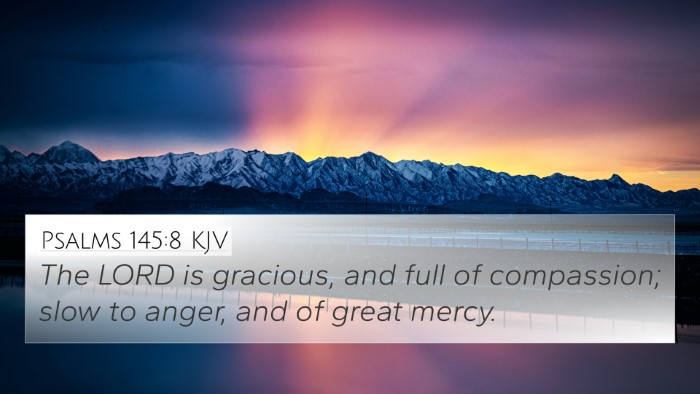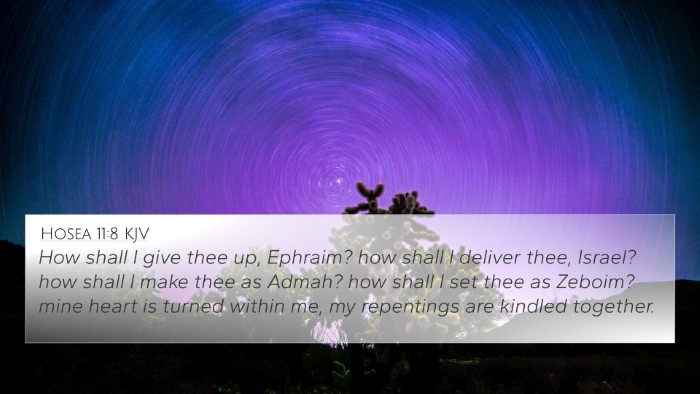Understanding Matthew 18:27
Matthew 18:27 states: "And the lord of that servant was moved with compassion, and loosed him, and forgave him the debt." This verse encapsulates a profound message of mercy and forgiveness, exemplifying the Christian principle of grace. Below, we will explore the insights derived from public domain commentaries to provide a comprehensive understanding of this scripture.
Context and Commentary Analysis
The context of Matthew 18:27 is rooted in the Parable of the Unforgiving Servant, illustrating the relationship between God's forgiveness and our obligation to forgive others. Commentators like Matthew Henry, Albert Barnes, and Adam Clarke shed light on the following key themes:
- Divine Compassion: Commentators note that the lord's compassion reflects God's mercy toward humankind. Matthew Henry emphasizes that it shows God's readiness to forgive the greatest debts, symbolizing sin.
- Release from Debt: The act of loosing him signifies not only forgiveness but also liberation. Albert Barnes points out that this parallels God's grace that releases believers from the bondage of sin.
- Forgiveness as a Covenant: Adam Clarke remarks that the master’s forgiveness implies an ongoing relationship based on grace rather than the legalistic demands of repayment.
Thematic Connections
This verse connects deeply with themes of forgiveness and mercy found throughout the Bible. Here are some Bible verse cross-references that highlight these connections:
- Luke 6:37: "Judge not, and ye shall not be judged: condemn not, and ye shall not be condemned: forgive, and ye shall be forgiven."
- Colossians 3:13: "Forbearing one another, and forgiving one another, if any man have a quarrel against any: even as Christ forgave you, so also do ye."
- Ephesians 4:32: "And be ye kind one to another, tenderhearted, forgiving one another, even as God for Christ's sake hath forgiven you."
- Romans 5:8: "But God commendeth his love toward us, in that, while we were yet sinners, Christ died for us."
- Psalm 103:12: "As far as the east is from the west, so far hath he removed our transgressions from us."
- James 2:13: "For he shall have judgment without mercy, that hath showed no mercy; and mercy rejoiceth against judgment."
- 1 John 1:9: "If we confess our sins, he is faithful and just to forgive us our sins, and to cleanse us from all unrighteousness."
- Matthew 6:14-15: "For if ye forgive men their trespasses, your heavenly Father will also forgive you: But if ye forgive not men their trespasses, neither will your Father forgive your trespasses."
Interpretative Insights
According to the commentaries:
- Matthew Henry: He articulates that the act of forgiving the debt represents God’s willingness to pardon and emphasizes the importance of extending this grace to others.
- Albert Barnes: He explains that the 'debt' indicates a moral obligation to forgive, highlighting the unpayable nature of our sins that only God's grace can cover.
- Adam Clarke: His insights regard the perspective of the forgiven servant who should reflect the same mercy he received when dealing with others.
Practical Applications
From this analysis, we can conclude with several practical applications:
- Embrace Forgiveness: Recognize the importance of forgiving others as an outflow of the forgiveness received from God.
- Cultivate Compassion: Follow the example of the lord in the parable by embodying a spirit of compassion towards those in need of mercy.
- Live in Gratefulness: Acknowledge the debt forgiven by God as a continual reminder to show grace to others.
Cross-Referencing Biblical Texts
Utilizing tools for Bible cross-referencing can deepen our understanding of concepts like grace and mercy as demonstrated in Matthew 18:27. Through systematic Bible study methods, one might explore deeper connections between this verse and others addressing the fundamental Christian themes of forgiveness.
Conclusion
Matthew 18:27 serves as a powerful reminder of the transformative nature of forgiveness. Through a comparative Bible verse analysis, we uncover not just a singular lesson but a broader biblical narrative advocating mercy, grace, and compassion. As believers, engaging in inter-Biblical dialogue through cross-referencing helps to enrich one's spiritual journey and enhances understanding of God's unfathomable love.
Further Study Suggestions
For those interested in delving deeper into the themes of this scripture:
- Explore the narratives of the Old Testament regarding mercy and grace.
- Conduct a study on the teachings of Jesus concerning forgiveness throughout the Gospels.
- Utilize a Bible concordance to find related verses discussing the nature of God's forgiveness.









